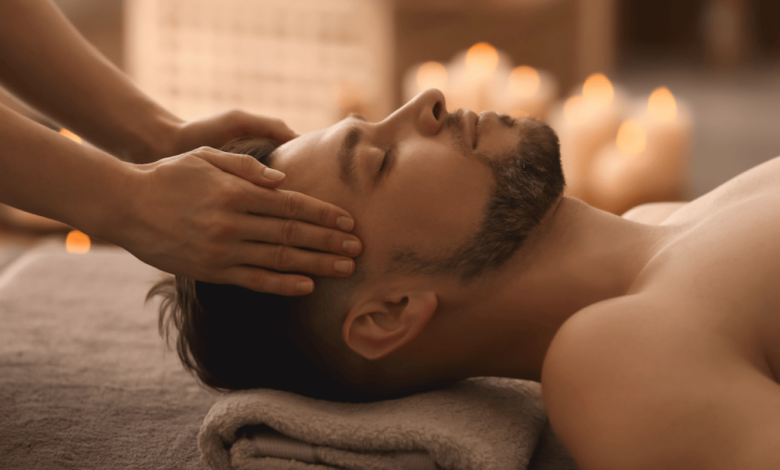Massage for Mental Health and Stress Relief

In today’s fast-paced world, stress has become an all-too-common part of life, affecting not only physical well-being but also mental health. The connection between body and mind is well-established, and one powerful tool to manage stress and support mental health is massage therapy. Massage for mental health and stress relief is more than just a luxury; it has become a widely recognized treatment that promotes overall well-being. This article will explore the benefits of massage for mental health, how it works to reduce stress, and why incorporating it into your wellness routine can be transformative.
How Stress Affects Mental Health
Chronic stress can take a significant toll on both the body and mind. It’s known to increase levels of cortisol, the body’s primary stress hormone, which, when elevated for long periods, can lead to anxiety, depression, insomnia, and even physical ailments like headaches, muscle tension, and digestive issues.
When stress becomes chronic, it impairs the body’s ability to relax and recuperate, creating a vicious cycle that negatively impacts mental health. While there are various ways to manage stress, massage therapy has emerged as a natural, holistic approach that not only eases physical tension but also supports emotional well-being.
The Mental Health Benefits of Massage Therapy
Massage therapy has long been associated with relaxation and physical relief, but its benefits for mental health are increasingly gaining attention. Here’s how massage therapy can positively affect mental well-being:
1. Reduces Anxiety and Depression
Massage therapy has been shown to lower cortisol levels and increase serotonin and dopamine—the “feel-good” chemicals that improve mood and promote a sense of well-being. A regular massage routine can help alleviate symptoms of anxiety and depression by creating a space for deep relaxation, which helps to reduce mental and emotional tension.
A study published in The Journal of Clinical Psychiatry found that individuals with anxiety disorders experienced significant reductions in anxiety levels after receiving massage therapy, highlighting its potential as a complementary treatment for mental health.
2. Promotes Better Sleep
One of the biggest challenges for those dealing with chronic stress is poor sleep quality. Massage therapy can directly impact sleep by promoting relaxation and reducing stress-related muscle tension. By encouraging the production of serotonin, a neurotransmitter that helps regulate sleep, massage can improve sleep patterns and lead to more restful, restorative sleep.
Better sleep not only improves mood and mental clarity but also supports overall mental health, as sleep is crucial for emotional regulation and cognitive functioning.
3. Alleviates Physical Symptoms of Stress
When stressed, the body tends to carry tension in areas like the neck, shoulders, and back, leading to muscle pain, headaches, and other physical discomforts. Massage therapy focuses on releasing this tension, which in turn can reduce the physical manifestations of stress.
By addressing these physical symptoms, massage helps create a sense of relief and relaxation that positively impacts mental health, as reducing physical discomfort can ease mental stress.
4. Encourages Mindfulness and Relaxation
Massage therapy provides an opportunity to disconnect from the stresses of daily life and focus on the present moment. This sense of mindfulness, or being fully present during the massage session, allows individuals to let go of anxious thoughts and relax deeply.
Massage therapists often use calming environments, such as soft lighting, soothing music, and aromatherapy, to create a tranquil atmosphere, further promoting relaxation and mental clarity.
How Massage Reduces Stress
Massage therapy works on multiple levels to reduce stress. Here’s a closer look at how it effectively targets the body’s stress responses:
1. Activates the Parasympathetic Nervous System
When we are stressed, our bodies activate the sympathetic nervous system, known as the “fight or flight” response. Massage helps shift the body into the parasympathetic nervous system, also known as the “rest and digest” state. This shift encourages the body to relax, lower blood pressure, and slow down heart rate, leading to a sense of calm and stress relief.
2. Decreases Cortisol Levels
Massage therapy has been shown to significantly reduce levels of cortisol, the hormone responsible for the body’s stress response. By lowering cortisol, massage not only helps reduce feelings of stress but also enhances the body’s immune function and reduces inflammation, both of which are impacted by chronic stress.
3. Releases Muscle Tension
Stress often manifests physically in the form of muscle tension, especially in areas like the neck, shoulders, and lower back. Massage therapy works to release these tight muscles, improving circulation and alleviating pain. When physical tension is reduced, mental relaxation often follows, providing a sense of overall stress relief.
4. Improves Circulation and Oxygen Flow
Massage improves circulation, which helps to oxygenate tissues and muscles. Better blood flow also supports brain function and mental clarity, which can reduce mental fog and help individuals feel more alert and refreshed. By improving circulation, massage also helps the body eliminate toxins, further supporting relaxation and healing.
Best Massage Techniques for Stress and Mental Health
Several massage techniques can be particularly effective for reducing stress and promoting mental well-being. Here are a few popular methods:
1. Swedish Massage
Swedish massage is one of the most common forms of relaxation massage. It involves long, smooth strokes, kneading, and circular movements on superficial muscle layers. This technique helps reduce muscle tension and promote relaxation, making it ideal for those looking to manage stress and enhance mental health.
2. Deep Tissue Massage
For those experiencing chronic stress or muscle tension, deep tissue massage can be especially beneficial. This technique targets deeper layers of muscle and connective tissue, working to release knots and chronic muscle tightness. By relieving these tension points, deep tissue massage helps reduce the physical symptoms of stress, leading to overall relaxation.
3. Aromatherapy Massage
Aromatherapy massage combines the benefits of massage therapy with the use of essential oils. Lavender, chamomile, and eucalyptus are popular oils used to promote relaxation and stress relief. Aromatherapy can enhance the mental health benefits of massage by soothing the mind and encouraging a deeper sense of calm.
4. Hot Stone Massage
Hot stone massage involves the use of heated stones placed on the body to help relax and loosen tight muscles. The warmth of the stones enhances relaxation and can be particularly effective for reducing stress and promoting mental calmness. This method combines the physical benefits of massage with the soothing effects of heat therapy.
Incorporating Massage into Your Wellness Routine
While a single massage session can provide immediate relief from stress, incorporating massage therapy into your regular wellness routine can offer lasting mental health benefits. Scheduling regular massages, whether weekly or monthly, can help maintain lower stress levels and promote overall emotional balance.
In addition to professional massage therapy, at-home techniques such as self-massage or using tools like massage guns and foam rollers can help manage stress between appointments.
Conclusion
Massage therapy offers a powerful, natural way to manage stress and improve mental health. By reducing cortisol levels, promoting relaxation, and addressing the physical symptoms of stress, massage can provide much-needed relief for those dealing with anxiety, depression, or chronic tension. Incorporating regular massage into your self-care routine can lead to lasting improvements in mental clarity, emotional balance, and overall well-being.
Whether you’re looking for a way to unwind after a stressful day or seeking long-term mental health support, massage for mental health and stress relief is a proven, effective tool that can enhance both your mind and body.





